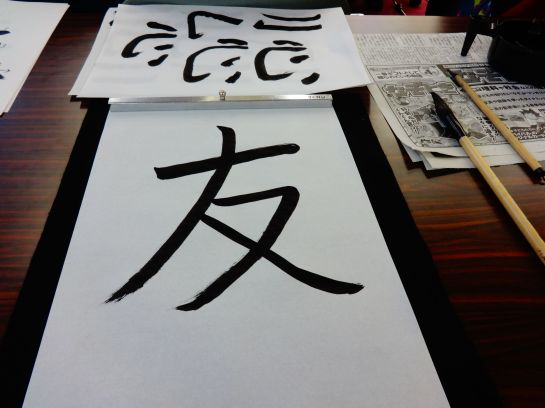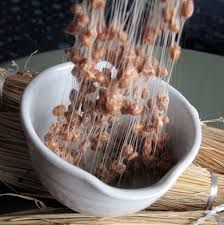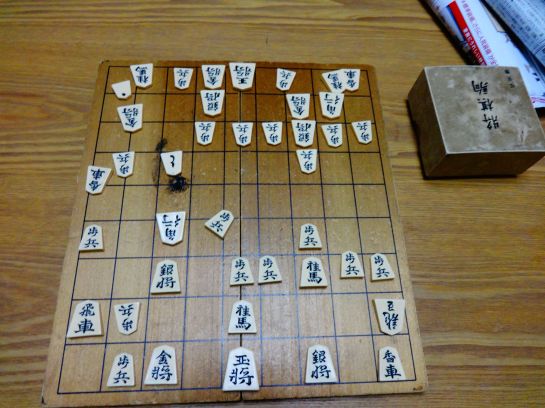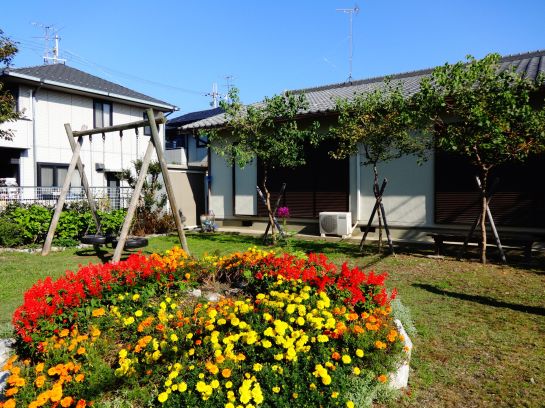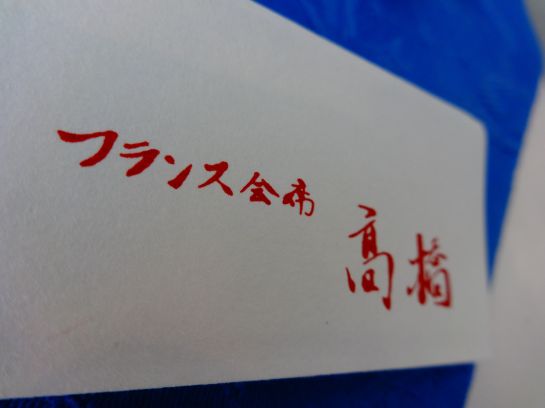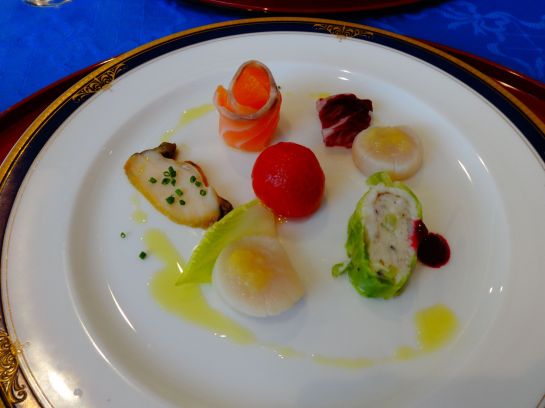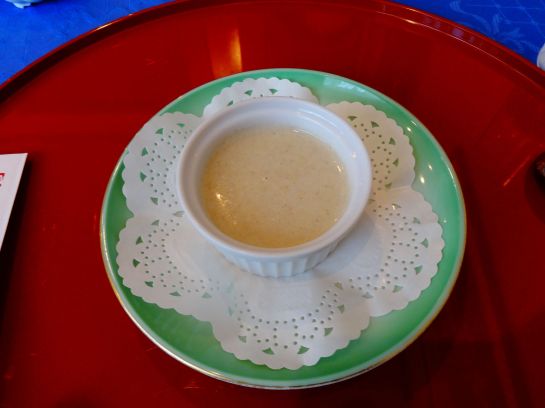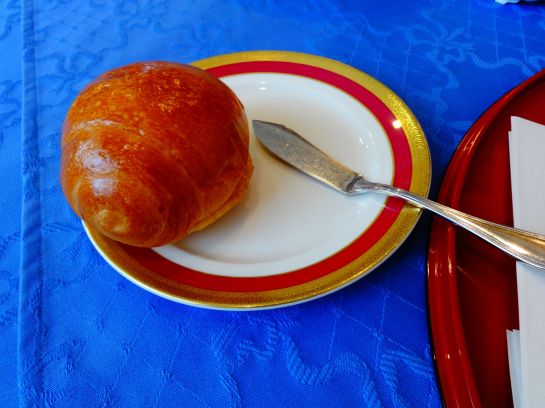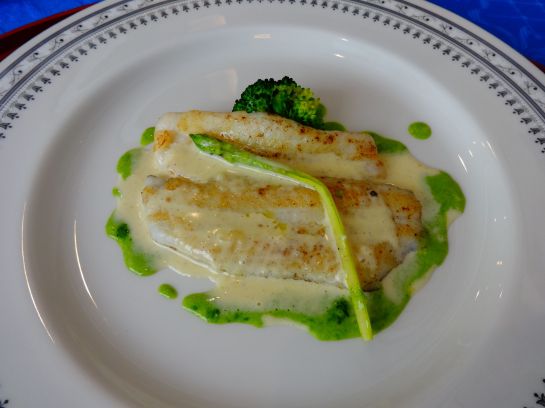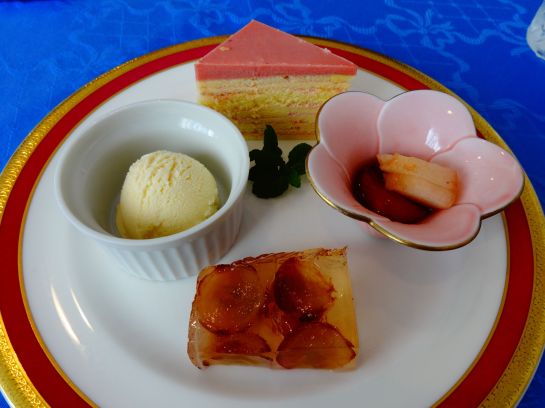If you’ve followed my previous adventures in Japan, you’ll know that I’ve done three homestays throughout the course of my journeys. Upon discovering that I’d have the chance to sign up for one more homestay, I eagerly put my name in and hoped for a good match. That was in September.
Late October rolled around, and soon enough we had our results — our families’ names and hobbies, printed on a clean sheet of paper, served as our first glimpse into a new (albeit temporary) life. I scanned my eyes over my own sheet; it was a family of just two, a married couple in their sixties. The wife, Sachiko, enjoyed cooking and tennis, and she volunteered at the Moriyama International Friendship Association. The husband, Toshizou, listed his hobbies simply as golf and driving.
*****
I began the day with a relaxing hour and a half of 書道 shoudo [calligraphy].
My final work was a large depiction of the characters 成長, meaning “growth.”
My anxieties about doing a homestay this time were much less than in the past, so I had only a quick jolt of nerves as my new host mother’s taxi pulled up to the front of my apartment. Rolling my suitcase to a stop in the genkan, I switched to my outdoor shoes. As I stood up and my hair fell away from my face, my eyes connected with the smiling eyes of a lovely Japanese lady bowing excessively to Yasu, who was of course bowing back.
On the ride back to the train station, my host mother was of course eager to ask me all sorts of questions — where I was from, what JCMU was like, what my family was like, and why I was studying Japanese. During the hour-long journey from Hikone to Moriyama by train and taxi, we rarely stopped talking (a testament to my improved Japanese since my previous homestays). Introducing herself as Sachiko, I finally had a face to put with the name written plainly on that piece of paper.
She could do nothing but smile as she told me that one of her three children is expecting — she’ll have a batch of new grandchildren come May. Even more precious was her slightly furrowed brows when she said that her husband, a dentist for the local hospital, wouldn’t be home until after 11. Throughout the course of my time with them, I got to see just what a sweet relationship the two of them have.
As we approached her house by foot, I examined the buildings — the curved roofs in traditional Japanese style masked behind fences covered in ivy and the tubing of window-model air conditioners. Sachiko-san’s house was an impressive one, with sidewalks stretching through an ornate gate and through a well-kept yard dotted with flowered gardens. Her house, as I recall it, had 9 rooms, including a large tatami room and three bedrooms above the double kitchen. I slipped my shoes off in the genkan and snuggled my toes into the pink slippers she’d set down for me — slippers lined in tatami.
We sat by the TV and flipped through an atlas, talking about places in the world that we’d been. I described my college city and my home town, as well as the other countries I’ve been to; she talked about her trip to Michigan to visit Adrian College. After a while of searching around on her computer, she found some pictures of the trip, and after another half an hour of trying to figure out how the slideshow function worked, she gave a quick tour of her journeys as well.
In describing my own hometown, one thing that I’ve always struggled to find the words for is “Amish.” My area is full of Amish people, but I had to resort to simply describing them in Japanese as people who came from Europe who work very hard, usually on farms, and have beards. She seemed to at least get the gist.
As we went on to making dinner together on the first night, she talked about how she had a part-time job at the post office three days a week. I cut up onions for yakisoba while she talked. As we sat down to dinner together, our two dinner plates small on the wide, lonely table, she gently placed another plate in front of me; staring back at me was the deep red flesh of a thick cut piece of fish.
I don’t mean sashimi, that nice thin fish you get on nigiri sushi. I mean like these triangular pieces of fish were marbled and about as thick as a sliced piece of bread. Sachiko-san said that they were a very rare delicacy, so I was happy to try them.
The meat was tough — so much so that I couldn’t get my teeth through it. The flavor filling my mouth as I tried to tear off a piece was a very strong mixture of raw fish taste mixed with the definite taste of sea salt, sand, and fish oil. For a moment, as the red skin finally came away, leaving ragged pink scars, I imagined myself as Gollum taking a big ol’ bite out of a raw fish.
*****
When I woke up the next morning, I was engulfed in fuzziness. The bed, which was cozy and soft in and of itself, was covered by — no joke — about a foot of cloud-like blankets. When I slipped out from underneath the futon blanket and went to make my bed, I fell face-first back into it because the soft comforters had so much give when I tried to rest my hand on them.
Host mom was already downstairs making breakfast, and host dad was watching TV on the floor in front of the couch. To be honest, I don’t particularly understand the function of a couch in a Japanese home. Japanese people seem to like to sit on the floor anyway.
Toshizou-san smiled at me and tried to make some light conversation, but being the shy guy that he is, he got so concerned about trying to throw in English words to help me understand that his sentences came out in some sort of heartfelt babble. Just Japanese would have been easier, but I appreciated the thought. I later found out from Sachiko-san that he had plans for us to go to a shrine — which made so much more sense than whatever he had said about a shreen.
Breakfast was a traditional Japanese one, with thick toast covered in cheese, a bowl of grapes, and another bowl with…natto.
Don’t know what natto is? That’s okay — you probably don’t want to. Imagine these little beans. And then imagine them getting so fermented that when you pick them up they leave huge long strings of, err, fermented juice substance. And then just pop that right into your mouth.
Being the foodie that I am, I had always wanted to try natto, and it has actually found a spot on my bucket list.
Thankfully, after cleaning up all the threads of fermented bean juice that hadn’t made it into my mouth, my host mom happily acknowledged that I didn’t have to eat the rest of it if I didn’t want it. Thank you, host mom.
Almost immediately after breakfast, after Toshizou-san had left, we started on making lunch. Sachiko-san said that a number of people were coming to the house today, and all but one were friends of hers from an English practice group. Apparently it was my role to be the token English speaker in the room and help them out for four hours or so over lunch, which I found exciting.
Because Halloween was fast approaching, Sachiko-san spent most of the morning hovering over the stove working on a miniature green gourd/pumpkin thing. She attempted to carve a face on it, but it was unfortunately mostly unintelligible, so she said.
After quite a while baking it, she also had the misfortune of tapping it the wrong way and making a big piece of it crack off. So she spent another good chunk of her morning time tying a twisty tie around it to keep it together while she filled it with…I’m not sure what.
While my host mother waged exasperated war with a pumpkin, I chopped veggies and cooked some noodles. Then I stuffed some tomatoes with potato salad and arranged them on a plate just so. I looked over to Sachiko-san just as she was silently scolding the pumpkin, telling it that it had better use that golden twisty tie to stay together…or else. She then set it aside with a “there, I hope you’ve learned your lesson” sort of nod.
We finished our meal preparation in about two hours with some yogurt mousse, which we worked together to stick little mint leaves in. TV time was short, and she said that I could go rest in my room since I must be tired from all the cooking — I think she just wanted to clean the kitchen. But I acquiesced and went upstairs; I needed to make some progress in Murakami’s A Wild Sheep Chase anyway.
Soon enough the house was bustling with a little flock of Japanese ladies (and one Japanese young man, a high school teacher who seemed to just tag along for the ride). Sachiko-san broke out the multitude of lunch plates, prepared in their meticulously organized way.
I was, of course, a hit among the Japanese ladies who had been studying English. They wanted to practice, but of course I also wanted to practice my Japanese, and it was hard to strike the balance between “I’m copping out and not using Japanese” and “I’m helping them with their English.” About an hour into the lunch, I brought up the topic of onomatopoeia and how often it is used in Japanese. That sparked a 20 minute discussion about everyone sharing their own favorite onomatopes that no one else knew.
The high school teacher, Umeda-san, knew no English, to which the other ladies scolded, “You should learn some! It is very useful!” He asked me what high schools are like in America, and I described them as less strict than their Japanese equivalents; no juku (cram school), shorter hours, and less strict teachers overall, I feel.
I went with the flow of the conversation wherever it took us, and we covered everything from how sugar is in virtually all American food to how Old English is different from modern English. I used the word “knight” as an example of how Old English would pronounce the K as well. Umeda-san couldn’t believe that English speakers can’t read Old English, but he was less surprised once he realized that Japanese people can’t read Old Japanese too.
We spent the rest of our time after lunch in the living room looking through everyone else’s pictures, taking new pictures, and generally just chatting. When everyone left, host mom of course sent them off with their own individually wrapped bags of lunch to eat later.
Eventually Toshizou-san came home and I washed up for dinner. As Sachiko-san was preparing it, Toshizou-san asked me what my hobbies were. I listed off a few things and then came to shougi (Japanese chess).
It seems that I just cannot do a homestay without getting suckered into playing shougi with a member of the family immediately after I get out of a shower. I didn’t even know this many Japanese people know how to play shougi!
Not, of course, that I’m complaining. Host dad tore through every cabinet in the house looking for his shougi board, and when he found it, he plopped down on the other side of the living room table and starting smacking down the pieces. I had won the last time I challenged a member of a host family, but this time would not be so easy.
I began in the same way I always do, by moving the king to one side of the board and surrounding him. However, I made one crucial mistake that basically cost me the game — I began advancing my pieces before freeing up the movement of my hisha, which is in my opinion the strongest piece in the game. Toshizou-san was the most aggressive player I’ve ever matched with. He immediately abandoned his king and sent his pieces strategically forward as fast as he could. Within just a few turns he already had multiple promoted pieces, and his promoted hisha, now “dragon king,” was shredding through my ranks. Without having freed up my pieces, I had to resort to sacrificing quite a few of my own soldiers to finally take down his dragon. By that time, he’d thinned my ranks enough that by dropping captured pieces back into my lines, I could do nothing to stop him.
He was a very good sport, though. He was willing to let me undo my moves, although I never took advantage of that because that’s not how I wanted to play. If I was setting a piece down and he thought it was a bad move, he would furrow his eyebrows and, with a low hum, say in Japanese, “Are you sure you want to do that?”
“Yes, I’m sure.”
“Okay,” he would say, “but are you sure you want to do that?”
It was a fun opportunity, and after all the times he’d been gone during my stay so far, I was happy I finally got to do something with him. Sachiko-san called us to dinner, which was yet again another huge meal — after I returned from my homestay, I vowed to not eat for the entire day just so that I could remember what it was like to be hungry.
As I worked on eating as much of Sachiko-san’s delicious food as I could (cold somen noodles doused in tomato sauce with tofu and fish flakes), our conversation turned to my coursework. I said that I was reading a book by Haruki Murakami, one of the most famous writers in Japanese history.
“Which one?” my host mother asked.
Oh dear. How does one explain “Wild Sheep Chase” in Japanese?
Since I couldn’t remember the word for sheep, my explanation of the title went like this, “Well, it’s a book about an animal. This animal is not a cow, but…it is very ふわふわ fuwafuwa [a Japanese onomatopoeia for “fluffy”], and sometimes you make clothes out of its fur. And in the book, people are chasing it.”
That…did virtually nothing.
About half an hour later, toward the end of dinner, host mom suddenly exclaimed, “Hitsuji wo Meguru Bouken!” She finally recognized which book I was talking about.
Since she’d found out that I had to read that book for class, she encouraged me to go and do my homework at about 8:15. I felt a little bad, as my host dad had just been showing me a new variant of shougi called hasami shougi or “sandwich shougi,” which is quite a lot like Othello. We still had it out on the table, and as I headed up to my room at host mom’s request, it seemed that Toshizou-san was a little sad, kneeling down to put away the shougi pieces.
*****
Toshizou-san was up and out the door just as I came down for breakfast, even though it was a Sunday. I slid into the too-big kitchen chair and started on my breakfast, which was a delicious daikon radish salad with corn soup and some sort of pizza-like bread roll things.
We were waiting for host dad to be done at work so we could go and explore Moriyama, Yasu, and Omihachiman, so Sachiko-san suggested that we go to a small park just down the street from her house. Maintained by the people who live on the block, the park was actually just a yard with gardens it in and a swing set. It was a nice, quiet place, and dozens of butterflies danced around the tops of open flowers.
Then I saw this giant spider take down a giant dragonfly, and I felt a little less safe.
We didn’t stay for long; just long enough to sit for a bit and talk about my parents’ jobs and my hometown. When we got back to the house, host mom took to cleaning while I watched an orchestra program on TV. She and I seemed to have the same interests in music (instrumental stuff), and this wasn’t the first time we had enjoyed music together. She had also put easy listening music on to play while we made lunch for the party the day before.
After a while, host mom came in and started flipping through the channels. She has this amazing thing on her TV that changes Japanese programs into English so she can learn. Like the voice changes to not-robotic English and Japanese subtitles pop up. “When I’m trying to learn English,” she said in Japanese, “I watch shows for little kids because they are easier to understand.” So she turned on an anime channel just in time for me to see some colorful magical girls with blue hair shout, “ハピネスチャージ!” [Happiness Charge!] and wave their magical wands around. Sparklesss.
Turns out I actually found what show that is. It’s this one. (This is the kind of anime foreigners assume all Japanese people watch. It is not. Obviously this is for kids. Adult anime is much more mature and realistic.)
When host dad returned home, we packed up into the car and drove to the hospital where he worked. Even though it was closed, he got us in and gave me a tour. The nurses on the floor for overnight patients were quite surprised to see me walking through. Toshizou-san was especially glad to point out his dental practitioner license, which was endorsed by a university from Sweden.
From there, Toshizou-san was the man with the plan. He suggested that we go to visit a shrine with a lotus garden (though the word “lotus” tripped everyone up for about 10 minutes). This must have been the shreen he had been talking about before.
However, finding the shrine itself turned out to be the real adventure. After getting lost repeatedly in the progressively narrowing streets of Yasu, he finally turned down an alleyway barely big enough for a car; we had about 4 inches on each side.
A few narrow escapes and one small wall bump later, we’d found the place. Everyone walked up to the gate excitedly…only to peer over and see a garden of dead plants.
“Apparently lotuses are spring flowers,” was all my host dad said.
*****
Still, Toshizou-san didn’t let the failed shrine tour get the best of him. He hit the road again, pulling over quickly for a beautiful view of a flower field in full bloom; I snapped a picture of the two of them among the flowers.
Then it was off to a restaurant host dad had picked out specially for my visit — a French Japanese restaurant in someone’s home. I don’t even want to think about what they paid for my meal, because as soon as I walked in, the very air smelled like actual fancy cuisine marinated in yen.
I don’t know, maybe when it all came down to it it wasn’t that expensive. But I do know that as I was eating I lost count of how many courses we’d been served. We started with a small plate of what I can only presume are hors d’oeuvres (I’ve never done this “cuisine” stuff before). The fact that there was very little on the plate and that it was drizzled in some sort of sauce just reeked of “fancy.”
The one at the top — the mandarin oranges wrapped in a piece of fish — was particularly good. Next came a very small bowl of soup, but I couldn’t tell what kind. It was kind of savory and sweet, as if the base was made of milk.
After that came some bread, followed soon after by a piece of fish with asparagus and broccoli. I impressed myself with my ability to cut the fish with chopsticks. They are, after all, CHOP sticks.
I couldn’t believe the plate that she brought out next — an entire Ohmi beef steak. Ohmi beef is widely considered to be far superior to Kobe beef, and Kobe beef already has a reputation as an expensive, luxurious meal. I don’t like steak, but I would eat that Ohmi beef steak every day for the rest of my life. The texture was amazing — creamy, smooth, and yet solid — and the flavor was a juicy blend that mostly relied on the beef’s own delightful taste instead of seasonings.
The waitress topped our meal off with a dessert plate and coffee (for which I requested orange juice as a substitute, since I can’t have caffeine). My host family momentarily panicked when they found out that the ice cream had alcohol in it; I said that I don’t like to drink alcohol because it makes me feel sick. But at just one tiny scoop, that ice cream would be completely fine, I told them.
Aside from the ice cream, the cake was prepared in typical Japanese fashion without much sugar. It had very little flavor, but it was still quite good. The jelly with grapes in it was also not very sweet, and I worked my way around the seeds in the grapes as I chewed. By far the best thing on the plate was the flower-shaped bowl of fruit. All of the fruit in it tasted…like flowers. Like you melted a honeysuckle Yankee Candle and just drank it.
It was phenomenal.
Needless to say I could barely move after the meal. So as we were driving along and I see a traffic sign for another shrine on the top of a mountain, I’m thinking, “You’re kidding, right?”
Thankfully, they were. As we made our way past the temple on the mountain, we occupied our time talking about flower names. I already knew a few in Japanese, and after Sachiko-san looked up one particular word’s English equivalent, I spent a good 10 minutes tutoring them on how to say “chrysanthemum.”
When we pulled into a gravel parking lot next to a wooden building at the base of the mountain, I wondered what we were doing. It wasn’t until we went inside that I realized the plan for the rest of the day. Every wall in the place was lined with ceramic bowls, cups, and anything else you could imagine. Host mom sat down with me in behind one of the crafting benches, and soon enough a lady in an apron plopped two giant pieces of clay down in front of us and started showing us how to use a pottery wheel.
My host mom and I spent the next two hours making pottery together. I saw a few of my friends come in to do the same — apparently their host families had had the same idea. But my host mom seemed to have made pottery before, so with her guidance, I was able to create something that was kind of a little bit possibly nice-looking.
Washing the grey clay off of my hands was like rinsing away my last bit of time with my host family. Soon enough I was once again standing on the steps up to my apartment, red suitcase in hand. I reached into my bag to grab a gift that I, as a baka gaijin, had completely forgotten to wrap (because, you know, it’s not like that’s an extremely important part of Japanese culture or anything). I presented it to Sachiko-san, who didn’t understand what it was (it was cinnamon honey butter). I told her that it was spiced butter made by the Amish people that I had told her about.
I didn’t realize that Toshizou-san wasn’t going to walk to the door with Sachiko-san and me, so I feel bad that I ended my time with him with a simple ありがとうございました [thank you very much]. Host mama wanted to find Yasu or someone else to let them know that I was home safe, but everyone was gone. I told her it wouldn’t be a problem, and finally I thanked her repeatedly before she at last turned and walked away.
I was left feeling that I hadn’t expressed everything that I wanted to, and it frustrated me. Here was this exceptionally kind family (who often spoke to me in keigo [extremely polite Japanese], no less), and I had managed nothing more than repeated “thank yous”? I resolved to write a letter detailing why I was so thankful to them. Now, more than a week later, that letter is ready to mail.
They drove off, and I returned to my apartment to find Anna lounging in her room. It was a happy reunion, and while it was great to be back, I do believe that this homestay was the best one I’ve ever done.
津田の家族さん、まことにありがとうございました。津田さんのおかげさまで、たいへんいい経験でした。日本のホームステイでの経験を決して忘れません。失礼なところも間違えたところも許して下さってありがとうございました。お大事に。

